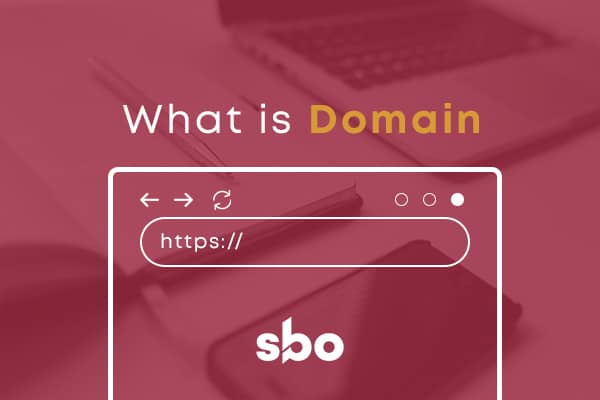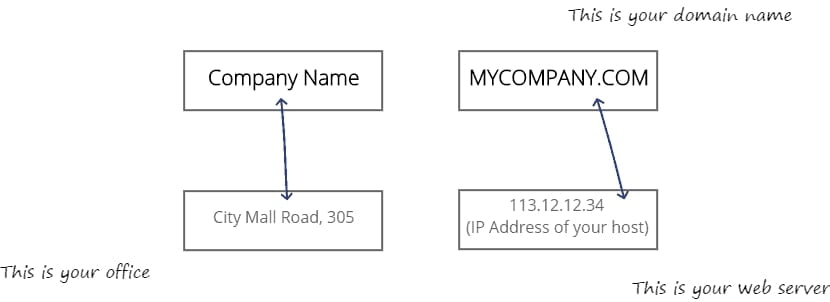What is Domain? A 3-Minute Beginner Guide to Understand Domain Name
A domain name is not just a technical shortcut, but the foundation of your digital identity, crucial for establishing your brand’s presence online.

What is a Domain Name?
A domain name is essentially your website’s address on the internet. It’s the unique URL that users type into their browser’s address bar to visit your site. Think of it as the digital counterpart to your business name, a distinctive label that identifies your space on the web.
For instance, “Google.com” and “Facebook.com” are examples of domain names that are instantly recognizable and reflect the brands they represent.
Domain Name vs. Web Hosting

It’s important to distinguish between a domain name and web hosting. While a domain name is your website’s address, web hosting is the service that allows your website to be accessed on the internet. In simple terms, if the domain name is your website’s street address, web hosting is the actual house that address points to. You need both to establish a website, but they serve different functions.
Choosing a Domain Name
Selecting the right domain name is a crucial decision that can significantly impact your online visibility and branding. Here are some best practices to consider:
- Reflect Your Brand: Your domain name should ideally mirror your brand name or the core essence of what your business offers. This enhances brand recognition and credibility.
- Keep it Short and Simple: A concise and easy-to-remember domain name is more likely to stick in people’s minds, making it easier for them to return to your site.
- Avoid Complicated Spellings: Steer clear of complex spellings, numbers, and hyphens that can confuse users and lead to typing errors.
- Use Appropriate Domain Extension: While .com is the most popular and universally recognized domain extension, there are numerous others (.net, .org, .info) including country-specific ones (.us, .uk, .ca) that might be more suitable depending on your business and target audience.
- Consider SEO: Although it’s not advisable to rely solely on Exact Match Domains (EMDs) for SEO benefits, choosing a domain name relevant to your business or industry can still help with your search engine visibility.
The Importance of a Good Domain Name
A well-chosen domain name can be a powerful asset in your digital marketing strategy. Here’s why:
- First Impressions: Your domain name is often the first thing potential visitors encounter. A good domain name can make a positive and lasting impression, while a bad one can turn people away.
- Branding: A unique and memorable domain name strengthens your brand, making it easier for customers to remember and recommend your site.
- SEO: While the impact of domain names on SEO has evolved, having a relevant and keyword-conscious domain name can still contribute positively to your site’s visibility in search engine results.
- Professionalism: A domain name that matches your brand and is professionally chosen reflects positively on your business, suggesting legitimacy and professionalism.
Keep in mind the importance of selecting a reliable domain registrar when registering your domain name.
A domain name is more than just an address for your website. It’s a vital component of your online identity, branding, and marketing strategies.
By choosing a domain name that is reflective of your brand, easy to remember, and SEO-friendly, you lay the groundwork for a strong online presence that can support your business’s growth and success in the digital realm.
Frequently Asked Questions
How much does a domain cost?
The cost of a domain name can vary widely based on several factors, including the domain extension (.com, .org, .net, .io, etc.), the registrar you choose to purchase from, and the popularity of the domain name. On average, a standard .com domain can cost anywhere from $10 to $20 per year. .SG domains will cost around $70 per year. Premium domain names, which are considered more desirable due to their brevity or keyword relevance, can fetch much higher prices, ranging from hundreds to even millions of dollars.
Should I own the domain?
Absolutely. Owning your domain name is crucial for several reasons. First, it ensures you have full control over your online brand and digital presence. When you own your domain, you can decide on the hosting service, website design, and content management system. It also protects your brand from being used by others, potentially harming your reputation or business. Having ownership means you can transfer the domain to another registrar or hosting service if needed, providing flexibility as your online needs change. Always register your domain name directly under your name or your business’s legal name to avoid any future disputes or complications.
What is domain privacy? Is it important?
Domain privacy, often referred to as WHOIS privacy, is a service offered by domain registrars that hides your personal contact information (name, email, address, and phone number) from the public WHOIS database. When you register a domain, ICANN (the Internet Corporation for Assigned Names and Numbers) requires your personal information to be listed in this public database, making it accessible to anyone who searches your domain name.
Domain privacy is important for several reasons:
Privacy Protection: It keeps your personal information private, safeguarding you against spam, unsolicited emails, and potential identity theft.
Spam Reduction: By hiding your contact information, you can significantly reduce the amount of spam and unwanted solicitations you receive.
Security: Keeping your details private helps protect you from potential hackers and cybercriminals who might use your personal information for malicious purposes.
Considering the relatively low cost of domain privacy (often just a few dollars a year), it’s generally recommended for individuals and businesses alike to opt for this service for enhanced privacy and security.
Is it better to use a country-specific domain?
Using a country-specific domain (ccTLD, like .uk, .ca, .de) can be advantageous depending on your target audience and business goals. Here are some points to consider:
Local Targeting: If your business primarily targets customers in a specific country, a ccTLD can help signal to users and search engines that your website is more relevant to that geographic location, potentially improving your search engine rankings within that country.
Local Presence: Some customers prefer doing business with websites that have a local presence, as indicated by a ccTLD, which can enhance trust and credibility.
Availability: Sometimes, the .com version of your desired domain name might be taken, but the ccTLD version could be available, giving you the opportunity to register a domain name that closely matches your brand.
However, if your business is international or you wish to target a global audience, a .com or other generic top-level domain (gTLD) might be more suitable as it doesn’t limit your website to a specific country. Ultimately, the decision should be based on your specific business needs, target audience, and long-term goals.
Explore More Content
Table of Content

